So, maybe you call your period by a pet name – chum, Aunty Flo, shark week, the curse, my maasi from Russia is visiting or even mere woh, because menstruation ka naam nahin lete, sharam aati hai. And when you have cramps, extra bleeding, vomity feelings and so on, you say “I’m not well ya”, because it’s normal na? Girls ko periods hota hai, and pain will come – it’s life, not a sanitary napkin ad! What is there to talk about? A period is only not normal when it does not arrive – amirite or what?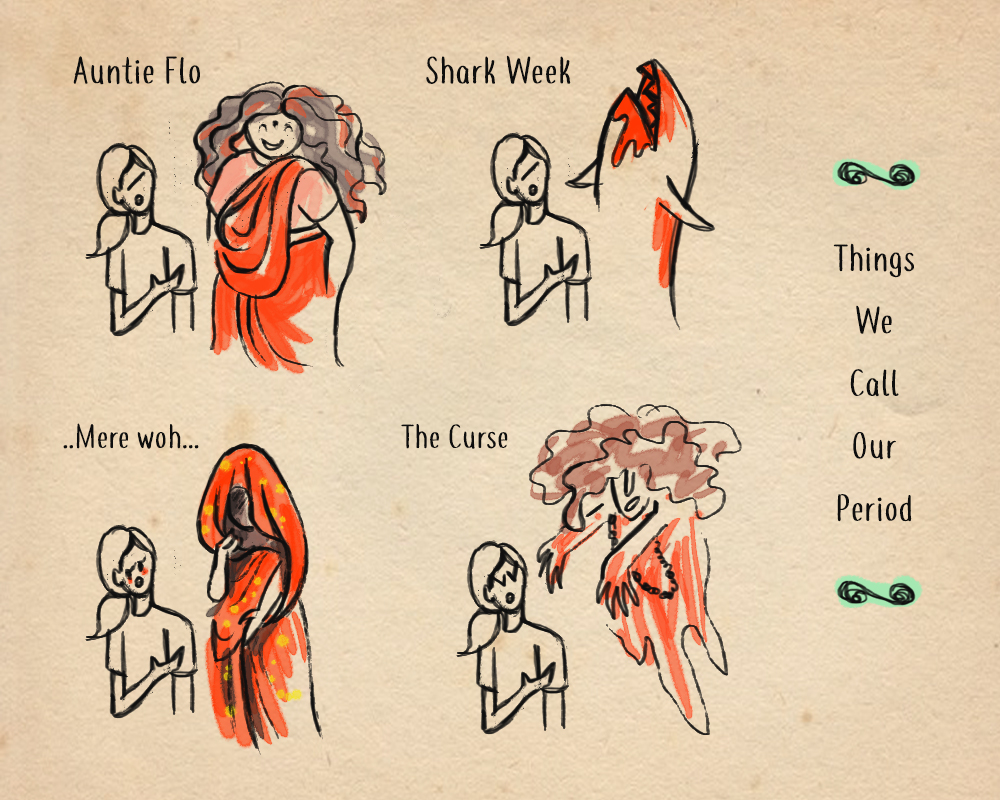 Well. It’s not that simple. So let’s talk about periods beyond the menstruation shame business.Yaar what are you saying now? That there is no such thing as a normal period?Well, what’s normal? There is no one identical kind of of period that happens to everyone. It’s more like there’s a range within which most normal periods fall.
Well. It’s not that simple. So let’s talk about periods beyond the menstruation shame business.Yaar what are you saying now? That there is no such thing as a normal period?Well, what’s normal? There is no one identical kind of of period that happens to everyone. It’s more like there’s a range within which most normal periods fall.
Stress, diet, and general lifestyle changes can also cause delayed or missed periods, or general changes to your cycle. These are normal, and should resolve after some time.
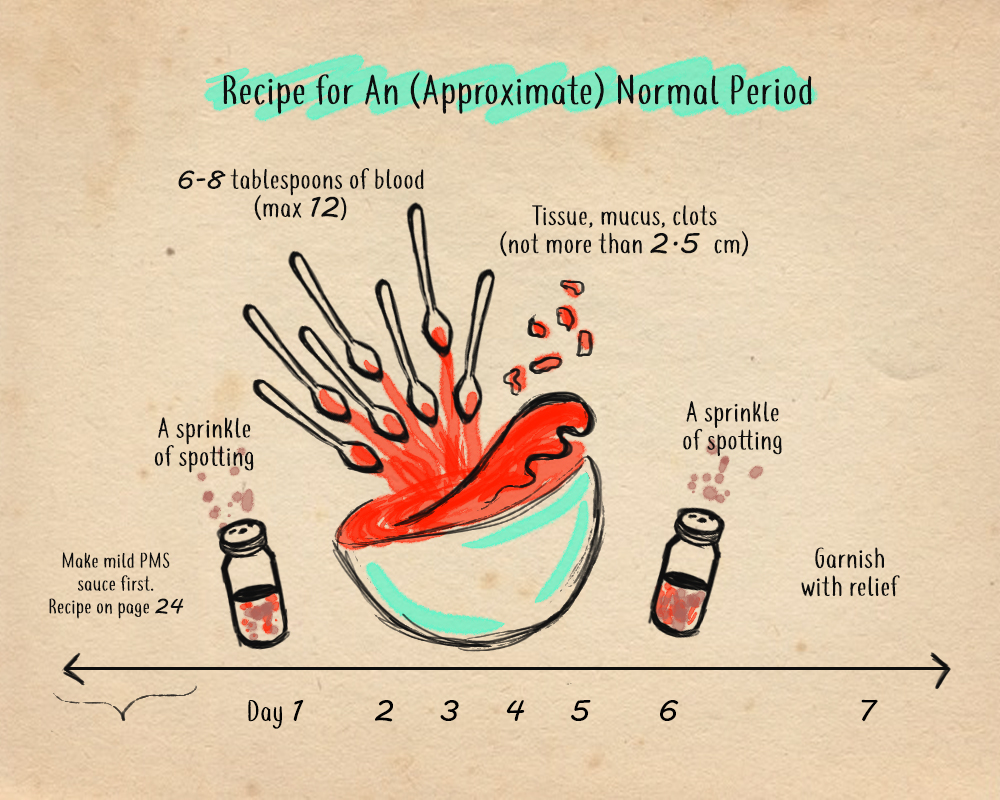 Achcha. If it’s a range then what is not normal?Heavy bleeding:
Achcha. If it’s a range then what is not normal?Heavy bleeding: 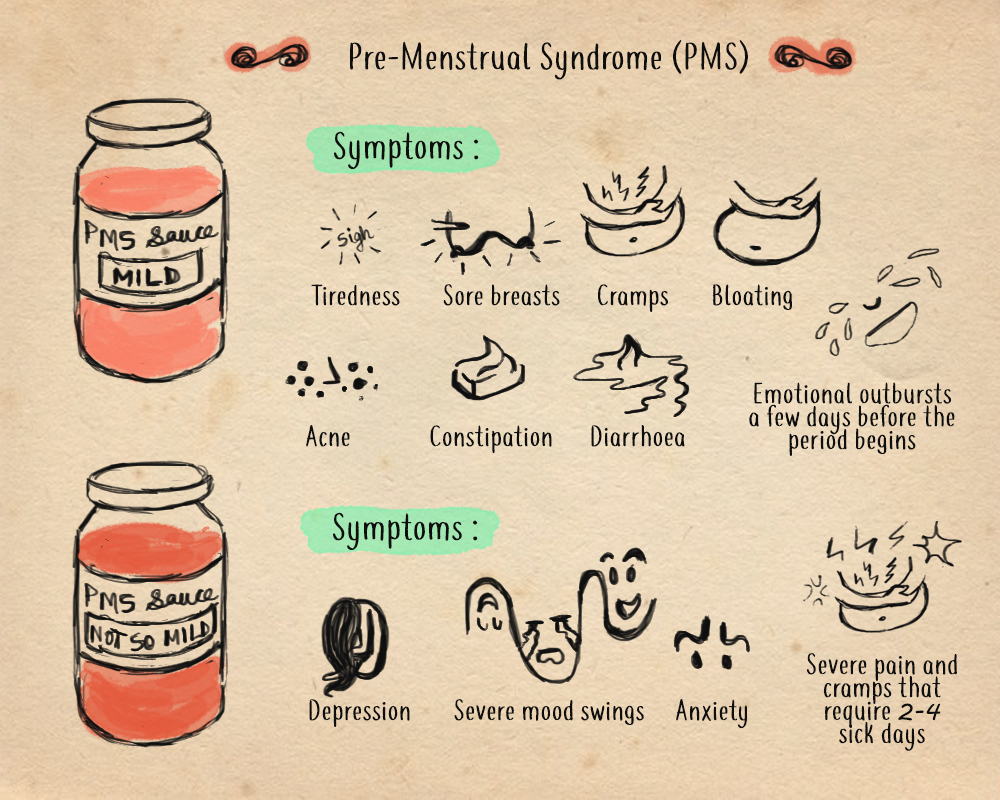 2) Pre-Menstrual Dysphoric Disorder: This is a rare but severe version of PMS and occurs in 3-8% of women.Symptoms of Pre-Menstrual Dysphoric Disorder: Depression, panic attacks, suicidal thoughts, insomnia, crying spells, anxiety around 10 days before period
2) Pre-Menstrual Dysphoric Disorder: This is a rare but severe version of PMS and occurs in 3-8% of women.Symptoms of Pre-Menstrual Dysphoric Disorder: Depression, panic attacks, suicidal thoughts, insomnia, crying spells, anxiety around 10 days before period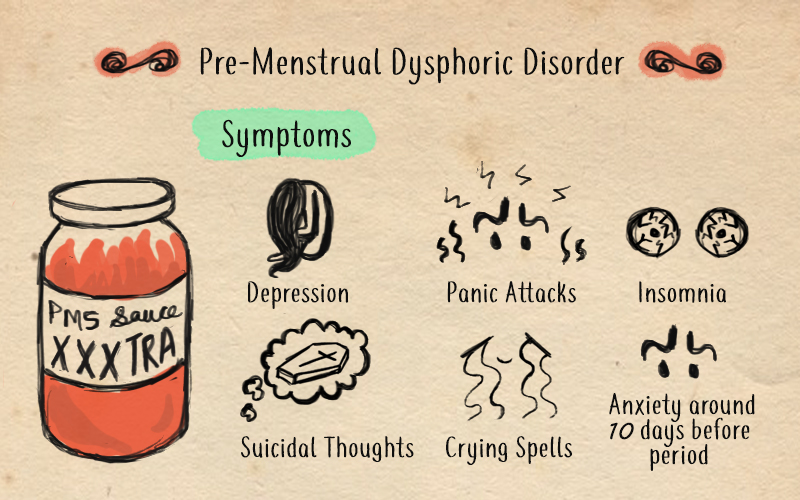 3) Anaemia: Anaemia indicates a shortage of the protein haemoglobin in the blood, which is caused by iron deficiency.Symptoms of Anaemia: Fatigue, pale skin, dizziness, shortness of breath, unusually rapid heartbeat – particularly with exercise, heavy bleeding, hair loss. Severely anaemic people sometimes develop a craving for ice
3) Anaemia: Anaemia indicates a shortage of the protein haemoglobin in the blood, which is caused by iron deficiency.Symptoms of Anaemia: Fatigue, pale skin, dizziness, shortness of breath, unusually rapid heartbeat – particularly with exercise, heavy bleeding, hair loss. Severely anaemic people sometimes develop a craving for ice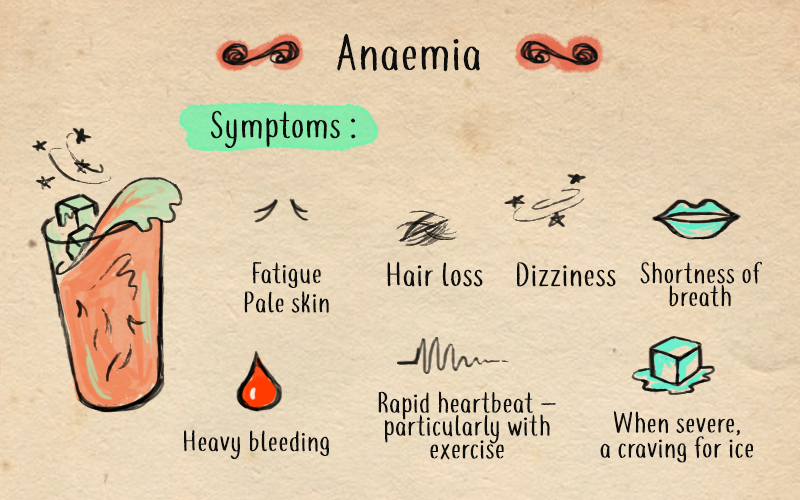 4) Poly Cystic Ovarian Disease (PCOD): Also known as Poly Cystic Ovarian Syndrome (PCOS), it is a common hormonal disorder that can cause enlarged ovaries with multiple small cysts.Symptoms of PCOD: Irregular periods, excessive pain, acne, excess body hair growth – especially on face, thinning of hair on head, weight gain
4) Poly Cystic Ovarian Disease (PCOD): Also known as Poly Cystic Ovarian Syndrome (PCOS), it is a common hormonal disorder that can cause enlarged ovaries with multiple small cysts.Symptoms of PCOD: Irregular periods, excessive pain, acne, excess body hair growth – especially on face, thinning of hair on head, weight gain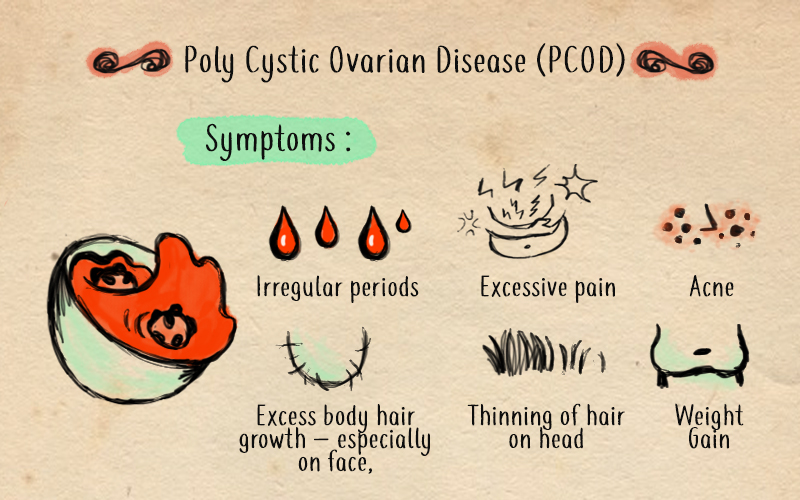 5) Endometriosis: It can be an extremely painful and often under-diagnosed condition that occurs when tissue that normally lines the inside of your uterus forms outside the uterus – in the ovaries, fallopian tubes, and tissue lining the pelvis.Symptoms of Endometriosis: Painful periods, infertility, excessive bleeding, painful intercourse
5) Endometriosis: It can be an extremely painful and often under-diagnosed condition that occurs when tissue that normally lines the inside of your uterus forms outside the uterus – in the ovaries, fallopian tubes, and tissue lining the pelvis.Symptoms of Endometriosis: Painful periods, infertility, excessive bleeding, painful intercourse 6) Fibroids: Tumours that form in the uterus that range from pea-sized to orange-sized. Most are not cancerous and may go undetected.Symptoms of Fibroids: Heavy bleeding, prolonged periods, abnormal bleeding between periods, pelvic pain, lower back pain.
6) Fibroids: Tumours that form in the uterus that range from pea-sized to orange-sized. Most are not cancerous and may go undetected.Symptoms of Fibroids: Heavy bleeding, prolonged periods, abnormal bleeding between periods, pelvic pain, lower back pain.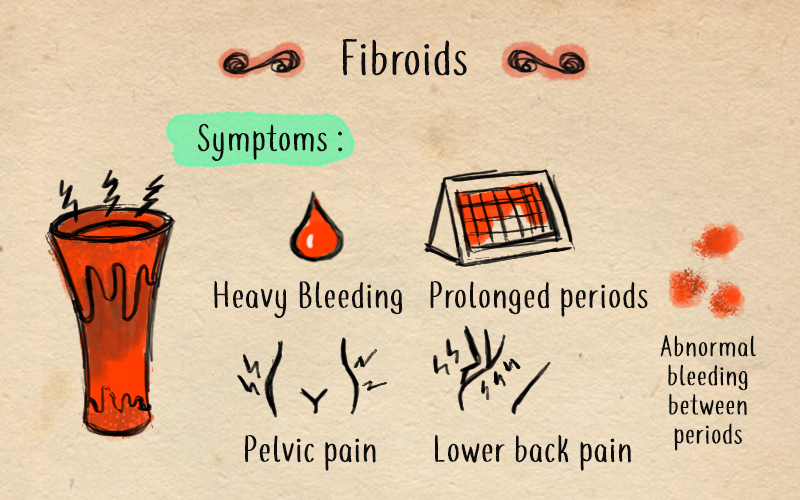 7) Pelvic Inflammatory Disease (PID): An infection caused by bacteria that usually starts in the vagina, and can spread to the pelvic organs. If it spreads to the blood, it can become dangerous and even life-threatening.Symptoms of PID: Pain in lower or upper abdomen, fever, vomiting, pain during sex or urination, irregular bleeding, foul-smelling vaginal discharge
7) Pelvic Inflammatory Disease (PID): An infection caused by bacteria that usually starts in the vagina, and can spread to the pelvic organs. If it spreads to the blood, it can become dangerous and even life-threatening.Symptoms of PID: Pain in lower or upper abdomen, fever, vomiting, pain during sex or urination, irregular bleeding, foul-smelling vaginal discharge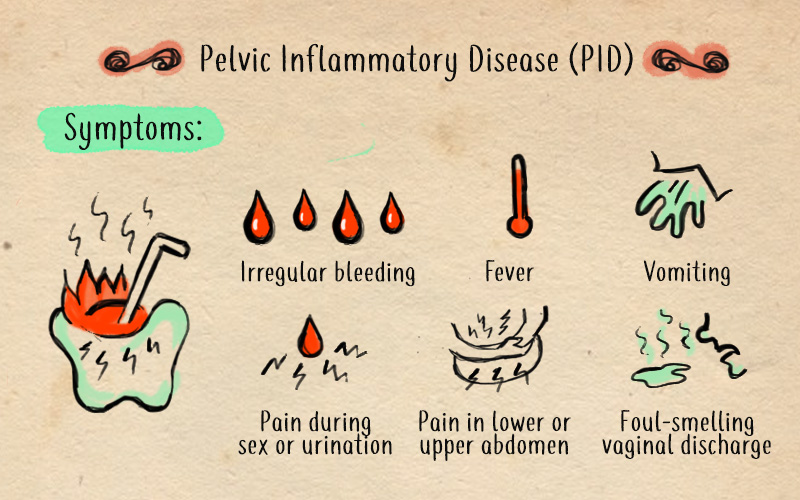 8) Toxic Shock Syndrome (TSS): A rare but dangerous infection caused by bacteria entering the bloodstream through a wound or broken skin. TSS is often found to occur when tampons are not changed frequently enough, though the link between TSS and tampons has not been medically proven.Symptoms of TSS: Sudden high fever, low blood pressure, headaches, seizures, muscles aches, confusion, rashes on palms and soles of feet
8) Toxic Shock Syndrome (TSS): A rare but dangerous infection caused by bacteria entering the bloodstream through a wound or broken skin. TSS is often found to occur when tampons are not changed frequently enough, though the link between TSS and tampons has not been medically proven.Symptoms of TSS: Sudden high fever, low blood pressure, headaches, seizures, muscles aches, confusion, rashes on palms and soles of feet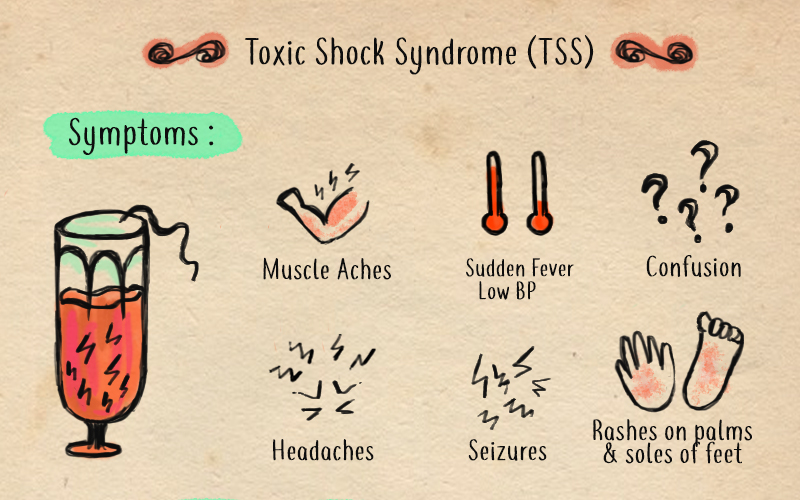 Treatment tell quickly!Treatment for these conditions can range from focusing on individual symptoms, such as painkillers or anti-depressants, to hormone therapies for PMS, PCOD and endometriosis. Antibiotics might be needed to treat PID and TSS, anaemia might require iron pills (or even blood transfusions, in severe cases), and in some instances, fibroids might require surgery. Please don’t go to Dr. Internet for treatment - let the gynaecologist decide what you need.Help me! I want prevention, not cure!No need to be alarmed. Basic menstrual health is linked to basic good health habits. Eating nutritious food and exercising regularly can go a long way towards being healthy overall – and thereby ensuring regular periods.But if you think your period isn’t as it should seem, don’t wait! See a doctor! Why live in pareshani when you can live in peace?
Treatment tell quickly!Treatment for these conditions can range from focusing on individual symptoms, such as painkillers or anti-depressants, to hormone therapies for PMS, PCOD and endometriosis. Antibiotics might be needed to treat PID and TSS, anaemia might require iron pills (or even blood transfusions, in severe cases), and in some instances, fibroids might require surgery. Please don’t go to Dr. Internet for treatment - let the gynaecologist decide what you need.Help me! I want prevention, not cure!No need to be alarmed. Basic menstrual health is linked to basic good health habits. Eating nutritious food and exercising regularly can go a long way towards being healthy overall – and thereby ensuring regular periods.But if you think your period isn’t as it should seem, don’t wait! See a doctor! Why live in pareshani when you can live in peace?
 Well. It’s not that simple. So let’s talk about periods beyond the menstruation shame business.Yaar what are you saying now? That there is no such thing as a normal period?Well, what’s normal? There is no one identical kind of of period that happens to everyone. It’s more like there’s a range within which most normal periods fall.
Well. It’s not that simple. So let’s talk about periods beyond the menstruation shame business.Yaar what are you saying now? That there is no such thing as a normal period?Well, what’s normal? There is no one identical kind of of period that happens to everyone. It’s more like there’s a range within which most normal periods fall.- TIME: Most periods come every 25-30 days. The time between the first day of your period to the first day of your next period id known as you menstrual cycle. The length of this cycle varies from person to person, and even from month to month. It can be as short as 21 days or long as 35 days. Periods can be 2-3 days early or late too so tension leneka nahin. Most periods are said to last 2-7 days but this also varies from person to person.
Stress, diet, and general lifestyle changes can also cause delayed or missed periods, or general changes to your cycle. These are normal, and should resolve after some time.
- FLOW: It might begin with spotting, matlab small brownish stains to indicate it is starting, followed by a heavier flow – different for different people – and then taper down to spotting level again. (Psst, in case you did not know, that stuff which comes out of your vagina is not only blood. It is a combo of blood, tissue, mucus and clots – which might look like small, brown chunks of tissue)
- FEELINGS: For some folks periods are like songs on the radio. Periods come, periods go, it’s basic. Some people have PMS like khayal gayaki: it starts and keeps growing till it comes to a gradual close. In the lead up to their period, people might experience acne, stomach cramps or lower back pain, bloated feelings, tender or sore breasts, tiredness, irritability, depression, shifts in mood.
- BONUS: Some people report an incredible feeling of rejuvenation (which might just be relief) after a period is over.
 Achcha. If it’s a range then what is not normal?Heavy bleeding:
Achcha. If it’s a range then what is not normal?Heavy bleeding: - Periods that last longer than 7 days
- Periods that seem to have a lot more blood-like blood, where it seems like you’re losing 2-3 times the blood you normally might (to be technical, over 80 ml or 16 teaspoons)
- Passing blood clots over 2.5 cm in size
- You bleed so much you stain your outer layer of clothes often, have to change your pad every one-two hours instead of every 4 hours or so.
- Pregnancy. If your period is a week or more late, chances are you could be pregnant. You can check with a pregnancy kit or visit to the doctor, or both
- Weight gain or weight loss
- Stress. This can be emotional/mental or physical, like long journeys and jet lag, which affect the body
- Intense exercise over long periods of time
- Certain kinds of contraception. Some kinds of birth control pills, contraceptive implants, and contraceptive injections can affect having one’s period
- Approaching menopause – anytime after 40, usually
- Hormonal imbalances, disease and illness (and more about this is coming up)
- Mild version: Tiredness, sore breasts, cramps, bloating, acne, constipation, diarrhoea, emotional outbursts a few days before the period begins
- Not so mild version: Depression, severe mood swings, anxiety, severe pain and cramps that require 2-4 sick days
 2) Pre-Menstrual Dysphoric Disorder: This is a rare but severe version of PMS and occurs in 3-8% of women.Symptoms of Pre-Menstrual Dysphoric Disorder: Depression, panic attacks, suicidal thoughts, insomnia, crying spells, anxiety around 10 days before period
2) Pre-Menstrual Dysphoric Disorder: This is a rare but severe version of PMS and occurs in 3-8% of women.Symptoms of Pre-Menstrual Dysphoric Disorder: Depression, panic attacks, suicidal thoughts, insomnia, crying spells, anxiety around 10 days before period 3) Anaemia: Anaemia indicates a shortage of the protein haemoglobin in the blood, which is caused by iron deficiency.Symptoms of Anaemia: Fatigue, pale skin, dizziness, shortness of breath, unusually rapid heartbeat – particularly with exercise, heavy bleeding, hair loss. Severely anaemic people sometimes develop a craving for ice
3) Anaemia: Anaemia indicates a shortage of the protein haemoglobin in the blood, which is caused by iron deficiency.Symptoms of Anaemia: Fatigue, pale skin, dizziness, shortness of breath, unusually rapid heartbeat – particularly with exercise, heavy bleeding, hair loss. Severely anaemic people sometimes develop a craving for ice 4) Poly Cystic Ovarian Disease (PCOD): Also known as Poly Cystic Ovarian Syndrome (PCOS), it is a common hormonal disorder that can cause enlarged ovaries with multiple small cysts.Symptoms of PCOD: Irregular periods, excessive pain, acne, excess body hair growth – especially on face, thinning of hair on head, weight gain
4) Poly Cystic Ovarian Disease (PCOD): Also known as Poly Cystic Ovarian Syndrome (PCOS), it is a common hormonal disorder that can cause enlarged ovaries with multiple small cysts.Symptoms of PCOD: Irregular periods, excessive pain, acne, excess body hair growth – especially on face, thinning of hair on head, weight gain 5) Endometriosis: It can be an extremely painful and often under-diagnosed condition that occurs when tissue that normally lines the inside of your uterus forms outside the uterus – in the ovaries, fallopian tubes, and tissue lining the pelvis.Symptoms of Endometriosis: Painful periods, infertility, excessive bleeding, painful intercourse
5) Endometriosis: It can be an extremely painful and often under-diagnosed condition that occurs when tissue that normally lines the inside of your uterus forms outside the uterus – in the ovaries, fallopian tubes, and tissue lining the pelvis.Symptoms of Endometriosis: Painful periods, infertility, excessive bleeding, painful intercourse 6) Fibroids: Tumours that form in the uterus that range from pea-sized to orange-sized. Most are not cancerous and may go undetected.Symptoms of Fibroids: Heavy bleeding, prolonged periods, abnormal bleeding between periods, pelvic pain, lower back pain.
6) Fibroids: Tumours that form in the uterus that range from pea-sized to orange-sized. Most are not cancerous and may go undetected.Symptoms of Fibroids: Heavy bleeding, prolonged periods, abnormal bleeding between periods, pelvic pain, lower back pain. 7) Pelvic Inflammatory Disease (PID): An infection caused by bacteria that usually starts in the vagina, and can spread to the pelvic organs. If it spreads to the blood, it can become dangerous and even life-threatening.Symptoms of PID: Pain in lower or upper abdomen, fever, vomiting, pain during sex or urination, irregular bleeding, foul-smelling vaginal discharge
7) Pelvic Inflammatory Disease (PID): An infection caused by bacteria that usually starts in the vagina, and can spread to the pelvic organs. If it spreads to the blood, it can become dangerous and even life-threatening.Symptoms of PID: Pain in lower or upper abdomen, fever, vomiting, pain during sex or urination, irregular bleeding, foul-smelling vaginal discharge 8) Toxic Shock Syndrome (TSS): A rare but dangerous infection caused by bacteria entering the bloodstream through a wound or broken skin. TSS is often found to occur when tampons are not changed frequently enough, though the link between TSS and tampons has not been medically proven.Symptoms of TSS: Sudden high fever, low blood pressure, headaches, seizures, muscles aches, confusion, rashes on palms and soles of feet
8) Toxic Shock Syndrome (TSS): A rare but dangerous infection caused by bacteria entering the bloodstream through a wound or broken skin. TSS is often found to occur when tampons are not changed frequently enough, though the link between TSS and tampons has not been medically proven.Symptoms of TSS: Sudden high fever, low blood pressure, headaches, seizures, muscles aches, confusion, rashes on palms and soles of feet Treatment tell quickly!Treatment for these conditions can range from focusing on individual symptoms, such as painkillers or anti-depressants, to hormone therapies for PMS, PCOD and endometriosis. Antibiotics might be needed to treat PID and TSS, anaemia might require iron pills (or even blood transfusions, in severe cases), and in some instances, fibroids might require surgery. Please don’t go to Dr. Internet for treatment - let the gynaecologist decide what you need.Help me! I want prevention, not cure!No need to be alarmed. Basic menstrual health is linked to basic good health habits. Eating nutritious food and exercising regularly can go a long way towards being healthy overall – and thereby ensuring regular periods.But if you think your period isn’t as it should seem, don’t wait! See a doctor! Why live in pareshani when you can live in peace?
Treatment tell quickly!Treatment for these conditions can range from focusing on individual symptoms, such as painkillers or anti-depressants, to hormone therapies for PMS, PCOD and endometriosis. Antibiotics might be needed to treat PID and TSS, anaemia might require iron pills (or even blood transfusions, in severe cases), and in some instances, fibroids might require surgery. Please don’t go to Dr. Internet for treatment - let the gynaecologist decide what you need.Help me! I want prevention, not cure!No need to be alarmed. Basic menstrual health is linked to basic good health habits. Eating nutritious food and exercising regularly can go a long way towards being healthy overall – and thereby ensuring regular periods.But if you think your period isn’t as it should seem, don’t wait! See a doctor! Why live in pareshani when you can live in peace? 







